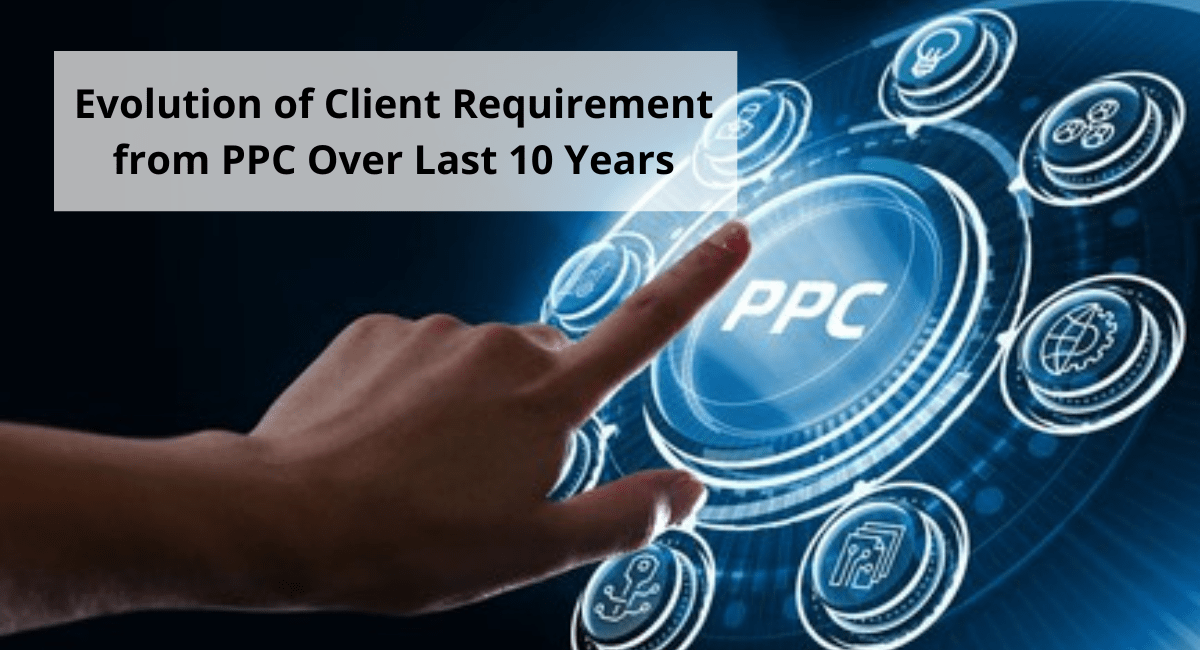Introduction
In today’s era, every business is online, whether small business, enterprise, or mid-sized business. So being online, no one is unaware of Digital Marketing. If you know Digital Marketing, you are certainly aware of the importance of PPC.
In this article, we will see how PPC marketing has changed since it started and how clients’ requirements changed accordingly.
So, tie your seatbelt as we are going a decade back to understand the evolution of PPC.
History of PPC
According to Wikipedia, in 1999, December was the month when Google put its foot in the search engine advertising. Later on, 2000 was the year when AdWords came into existence, giving the freedom of creating text ads to placing them on the Google search engine. And then came the year when PPC was actually introduced, and it was 2022.
It was only the starting, and later on, many changes were made. Even in the upcoming years, be ready to see unimaginary revolutions as per the PPC company in India.
So, here let’s talk about some vital evolution from past years.
2002
It was the year when Google started charging advertisers whenever their ads were clicked by a user. Before that, advertisers got charged based on CPM.
2004
This year, Google had a lot to celebrate. They achieved a milestone of $1 billion in online advertising revenue. Their market share had seen tremendous growth of 84.7%. But it was the same year when Google had a formidable competitor in the market - Facebook.
2005
Entertainment had a new face - YouTube. Fast forward to today’s date, it has become the bread and butter of many people. This was the year until the advertising industry was about to change drastically.
2006
Google bought Marc Broadcasting for $102 million and promised to pay $900 million later on. Further, they released AdWords Editor in beta, which can be installed on your PCs and work in an offline mode. This is the best tool for managing multiple campaigns, as suggested by the PPC company in India.
Not to forget, this was the same year when Google acquired YouTube for $1.6 billion.
2007
It was the year when Facebook and Google had become competitors as Facebook launched Facebook Ads Network. Facebook Ads were more organized compared to Google AdWords, making them easier for businesses to connect with targeted audiences. So, Google decided to become more transparent with its users and introduced Google Analytics.
2009
The same year, Google purchased another advertising network, but this time they bought the mobile advertising network AdMob for $750 million. From this, their motto was clear: they did not want to be limited as a search engine only. Prior to 2009, advertisers were not worrying about mobile advertising, but from onwards, they had to.
2011
Negative keywords adding feature was introduced to give a better return of investment to the advertisers. Along with this, Google introduced enhanced CPC to offer better historical data.
Google AdWords Express, Seller rating extensions, and AdBlock are the babies from 2011. However, people were unhappy with the AdBlock extension as it had become a red signal in their ad revenue.
2013
Google finally started focusing on enhanced campaigns. The advantage of this was advertisers were making the campaign focus on location, device, and time. This is the same year Google gave birth to keyword planner, which is now part of Google Ads.
2014
Google started giving priority to HTTPS websites. Also, Google stopped promoting adult ads on AdWords, which disappointed many advertisers.
2015
In 2015, mobile search volume was bigger than desktop search intent for the first time in history. But it’s been seen that when it comes to conversion, the desktop still is the winner. On the other hand, Facebook had a great year.
2020
Not only the PPC but the world witnessed tremendous changes. Everyone was at home, which means they were spending more time watching YouTube, scrolling Facebook and Instagram, ordering online, etc. Even that was the time when offline businesses shifted everything online; as a result, PPC marketing had seen massive growth.
Even if we talk about 2022, we are still witnessing the outbreak of the Covid and no one knows how long it will stay with us.
As a result, small to big-sized businesses are making their debut online and changing their ways of marketing.
More are shifting towards the PPC as you have seen the evolution of PPC and the way marketing has changed so far.
